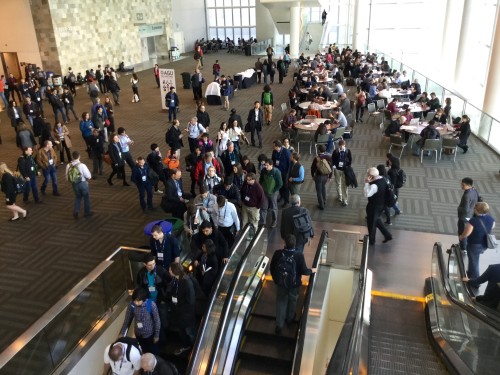Tag archives: climate
American angst

Danger ahead – Donald Trump’s election as US president will not be business as usual for science policy. (Courtesy: iStock/uschools)
By Matin Durrani
Like many people, I’m fearful of the imminent Donald Trump presidency, given the many sexist, racist and otherwise unpleasant remarks he made during the US election campaign. However, his slogan – “Make America great again” – proved powerfully effective for many voters. Who, after all, could disagree with renewed domestic glory? Sadly, Trump’s plans for achieving that goal – what little we know of them – are based on such ill-informed and ignorant views that he could damage America’s long-standing leadership in many areas, including science.
View all posts by this author | View this author's profile
Are reticent climate researchers ‘failing humanity’?

By James Dacey in San Francisco
Droves of delegates poured into the Moscone Center in San Francisco today for day one of AGU Fall 2015 – the largest Earth and space-science meeting in the world, with a whopping 24,000 delegates expected over the week. Having arrived from the UK on Saturday night, the jet-lag has kicked in with a vengeance today, so a couple of the conference coffees were definitely in order this morning. I’m just taking a break now after an interesting session about communicating climate change, and whether those researchers who don’t engage in the public debate are “failing humanity”.
The room was packed to the rafters, no doubt down to the profile of the speakers. First up was James Hansen, the former NASA scientist who has been outspoken in his criticism of the recent COP21 climate discussions, or at least the lack of concrete proposals to cut carbon emissions. Hansen restated his beef with the deal and argued that the only workable solution is for authorities to collect a carbon fee at source, such as charging domestic mines for the weight of carbon they sell. This, he believes, is the most effective way to make renewable energy and low-carbon options more viable. Not one to pull his punches, Hansen described US Energy Secretary Ernest Moniz’s idea that China will be able to curb much of its carbon missions using carbon capture and storage (CSS) technologies as “pure unadulterated bullshit”.
Designing smarter cities
By James Dacey in Berkeley, US
This weekend politicians at the COP21 summit in Paris signed a landmark legal agreement to keep global temperature rises at bay by curbing carbon emissions. The tricky next question of course is: how are we actually going to do this? In this short video, civil engineer Arpad Horvath of the University of California Berkeley explains that one of the aspects will be a fundamental rethink of our urban infrastructures. Horvath believes we need to move towards “smart cities” with smaller carbon footprints at all levels – from greener individual buildings, to more sustainable transport networks.
Uncovering the truth in social media

Truth and lies in the web of social media. (Courtesy: Shutterstock)
By James Dacey
“On 27 August…Mars will look as large as the full Moon.”
This was a sentence from a widely circulated e-mail in 2005, in the lead up to one of the closest encounters between Earth and Mars in recorded history.
That our neighbouring planet could appear as prominent as the Moon is, of course, complete claptrap. Since the “Mars hoax” first appeared in 2003, it has re-emerged several times over the past decade.
The Mars hoax is an example of a “meme”, a piece of content or an idea that is spread virally across Internet networks. These days, memes such as this can spread with increasing speed and reach, thanks to the ever-growing expansion of social-media sites such as Facebook and Twitter.
Now, however, researchers at MODUL University Vienna are setting out on the ambitious task of assessing the truthfulness of information that goes viral on social-media sites. The folks behind the project, called PHEME, say that one of their major aims is to acquire an improved understanding of the types of dubious information that are most likely to spread across networks.
View all posts by this author | View this author's profile